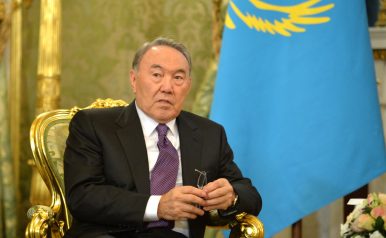Telegraph, 10 Nov 2016
European leaders and senior former military officers have called on Donald Trump to clarify his position on Nato amid fears that the US president-Elect’s rhetoric on Russia could undermine trans-Atlantic security.
The warnings came as the Russian government confirmed that it had been in touch with Mr Trump’s team during the election campaign, despite repeated denials of interference in the election.
"I don't say that all of them, but a whole array of them, supported contacts with Russian representatives," he said, adding that Hillary Clinton’s team had refused to similar invitations to meet.
Mr Ryabkov added that there was “no euphoria” over Mr Trump’s election and that so far Russia does “not expect anything special from the new US administration.”
"We have not seen any reason to depart from our assessment of the campaign that there was a bipartisan consensus in the United States that has an anti-Russian basis,” he said.
Mr Trump has been praised in the Russian press as a political realist who may end what many see as American aggression against Russia. There was applause in the Russian parliament when his victory was announced.
Russian politicians and pundits have openly speculated about Mr Trump dropping sanctions or even formally recognizing the 2014 annexation of Crimea.
But top military and diplomatic figures in Europe fear Mr Trump's rhetoric could spell the end of basic elements of trans-Atlantic security doctrine and encourage Russia to repeat Ukraine-style interventions against Eastern European Nato members.
Mr Trump is on record describing Nato as “obsolete and extremely expensive,” and has suggested he would not honour article five commitments to defend other alliance members unless he was satisfied they had paid their fair share for defence.
Donald Trump's election as US president dominated the Russian front pages on Thursday
“The danger is that if there is any question mark over the implementation of article five, that effectively neutralizes the Nato doctrine of collective defense. It casts doubt on its credibility. So the deterrent effect is neutralized,” said General Sir Richard Shirreff, a former Nato deputy supreme commander Europe.
Gen Shirreff said he was “sympathetic” to the view that European allies needed to spend more on defence, and warned that “by failing to step up to the mark, Europe is reinforcing this isolationist tendency in the United States.”
Last week the Telegraph revealed UK military intelligence has raised concerns that Western armies may soon be outgunned by new Russian tanks.
European policy makers called for Mr Trump to clarify his position on Nato on Thursday.
“I really hope that the rhetoric on defence and Russia was mostly a part of the election campaign," said Saulius Skvernelis, Lithuania's incoming prime minister.
"We would like to know what intentions he has regarding the alliance.” Jean-Claude Juncker, the head of the European Commission, said on Thursday.
The prospect of a rapprochement between Mr Trump and Vladimir Putin also set alarm bells ringing in Ukraine, for which the US has been a key ally since a Viktor Yanukovych, a Russia-leaning president, was overthrown in a revolution in 2014.
Nadia Savchenko, the former army helicopter pilot who spent two years in Russian custody after being captured fighting in east Ukraine, appealed to Mr Trump “not to leave Ukraine one-on-one with the aggressor.”
“I appeal to you with the kind request to maintain and even to strengthen sanctions against the Russian Federation, because this country understands only force,” Ms Savchenko, who is now an MP, wrote in a letter to Mr Trump published on Thursday.
Petro Poroshenko, the Ukrainian president, offered his “sincere congratulations” to Mr Trump on Wednesday, and pointedly reiterated his faith that the new president would continue to support Ukraine “in our fight against Russian aggression.”
“I very much appreciate your comment this morning that the sanctions will be rolling over n December and the new president will remain a reliable partner in our cooperation for fighting for freedom and democracy, “ he said in a televised meeting with Marie Yovanovitch, the US ambassador to Ukraine, on Wednesday.
President Obama imposed sanctions on a number of Russian individuals and businesses following Russia’s annexation of Crimea and military involvement in the war in eastern Ukraine.
Because the sanctions were imposed by executive order, Mr Trump could theoretically reverse them without consulting Congress.
No comments yet.
- AFGHANISTAN MAY HAVE TO ACCOMMODATE 1.5 MILLION REFUGEES IN 2016 Asia - Pacific 11.11.2016
- PRESIDENT NIKOLIC TO INVITE TRUMP TO VISIT SERBIA The Balkans 11.11.2016
- BULGARIA SIGNS DEAL TO BUY 10 RUSSIAN ENGINES FOR AGING FLEET The Balkans 11.11.2016
-
 IN EAST ASIA, KAZAKHSTAN PUSHES FOR NUCLEAR NONPROLIFERATION
Asia - Pacific
11.11.2016
IN EAST ASIA, KAZAKHSTAN PUSHES FOR NUCLEAR NONPROLIFERATION
Asia - Pacific
11.11.2016
- TURKEY NOT TO ALLOW PKK PRESENCE IN IRAQ'S SINJAR Iraq 11.11.2016
-
25.01.2016
THE ARMENIAN QUESTION - BASIC KNOWLEDGE AND DOCUMENTATION -
12.06.2024
THE TRUTH WILL OUT -
27.03.2023
RADİKAL ERMENİ UNSURLARCA GERÇEKLEŞTİRİLEN MEZALİMLER VE VANDALİZM -
17.03.2023
PATRIOTISM PERVERTED -
23.02.2023
MEN ARE LIKE THAT -
03.02.2023
BAKÜ-TİFLİS-CEYHAN BORU HATTININ YAŞANAN TARİHİ -
16.12.2022
INTERNATIONAL SCHOLARS ON THE EVENTS OF 1915 -
07.12.2022
FAKE PHOTOS AND THE ARMENIAN PROPAGANDA -
07.12.2022
ERMENİ PROPAGANDASI VE SAHTE RESİMLER -
01.01.2022
A Letter From Japan - Strategically Mum: The Silence of the Armenians -
01.01.2022
Japonya'dan Bir Mektup - Stratejik Suskunluk: Ermenilerin Sessizliği -
03.06.2020
Anastas Mikoyan: Confessions of an Armenian Bolshevik -
08.04.2020
Sovyet Sonrası Ukrayna’da Devlet, Toplum ve Siyaset - Değişen Dinamikler, Dönüşen Kimlikler -
12.06.2018
Ermeni Sorunuyla İlgili İngiliz Belgeleri (1912-1923) - British Documents on Armenian Question (1912-1923) -
02.12.2016
Turkish-Russian Academics: A Historical Study on the Caucasus -
01.07.2016
Gürcistan'daki Müslüman Topluluklar: Azınlık Hakları, Kimlik, Siyaset -
10.03.2016
Armenian Diaspora: Diaspora, State and the Imagination of the Republic of Armenia -
24.01.2016
ERMENİ SORUNU - TEMEL BİLGİ VE BELGELER (2. BASKI)
-
AVİM Conference Hall 24.01.2023
CONFERENCE TITLED “HUNGARY’S PERSPECTIVES ON THE TURKIC WORLD"









